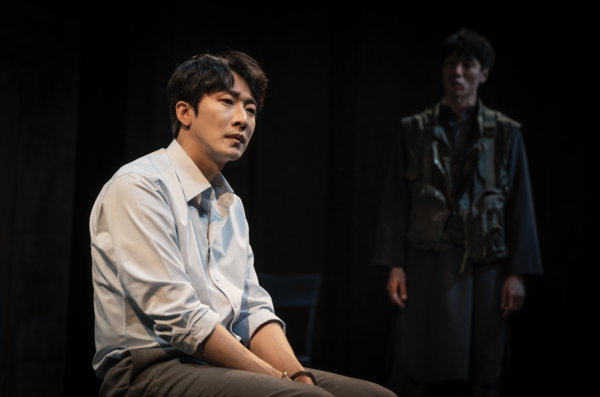
Do you believe in fate, or do you believe in destiny? Are our lives defined by a predetermined course of events or does our every interaction with the world continuously change our future?
The Invisible Hand, written by Pulitzer Prize-winning Playwright Ayad Akhtar, made its debut in Korean theaters on May 24. Based on Adam Smith’s economic concept of the “Invisible Hand” which is introduced in his book The Wealth of Nations, the financial thriller follows Nick Bright, an American banker working in Pakistan, as he attempts to pay off a massive ransom in hopes to be free from his kidnappers, a Pakistan militant group led by Imam Saleem.
The key purpose of Nick’s captivity is made clear from the beginning; money for the Pakistani people. However, with his boss unwilling to pay the ransom, as any interaction with terrorists would be deemed immoral, Nick tries to find a way to be of value to his captors. Using his knowledge and expertise in the financial realm, he plays a dangerous game with the organization; promising to earn a total of ten million dollars through the stock market within 12 months, in exchange for his freedom.
The play begins as the audience watches Nick easily gain the trust of Dar, a young, clueless jail guard. Having helped Dar earn some extra cash, Dar secretly eases Nick’s handcuffs and allows Nick to have a relevantly pleasant time while being held captive. However, the situation changes when Nick strikes a deal with the Imam for his release and is introduced to Bashir, the Imam’s righthand man. Although the dynamic between the two begins with Bashir being Nick’s captor, they begin to develop an oddly peaceful friendship over time, as Nick becomes Bashir’s financial mentor under the Imam’s orders.
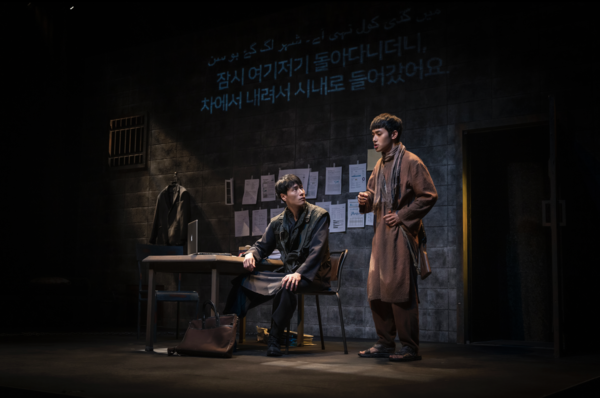
However, disaster begins as the characters start moving according to their own interests for what they believe to be the greater good. With guns to their heads, each character is forced to make rash decisions that bring unimaginable consequences.
Audiences are kept on the edge of their seats trying to figure out what method would help Nick escape from the prison. Each character changes over time. Whether it is for the better or worse is for the viewer to decide. However, one thing is sure: every decision made is given understandable circumstances and seemingly logical reasoning. This leaves audiences confused as to why they might be secretly siding with the unexpected.
One can see the extent of consideration that has gone into the play from the very beginning. A recording of Dar explaining theater etiquettes is played as audiences settle into their seats. Dar asks the audience to turn off their phones to prevent Nick’s location from being tracked by the Americans, closing the gap between the play and reality. As individuals hastily follow Dar’s request, they no longer exist as the audience but as accomplices of the kidnapping.
The distance between the performers and the audience is much closer than expected. The intimacy of the small theater allows actors to perform freely without a microphone. Every movement made and emotion expressed feels personal. The audience experiences the fear and hopelessness of Nick and holds their breath through every scene, hoping not to aggravate the members of the Pakistan militant group. Additionally, the careful usage of lighting that dims as Nick starts to forget his former life creates angst that remains even after the final scene. Nothing on the stage is meaningless, Nick’s suit, his bed, his water; everything adds to the depth of the story.
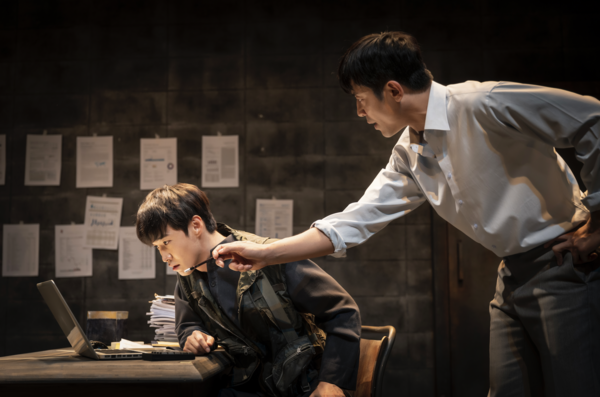
The play also brilliantly uses technology to reflect the digital world. From viewing the thrilling highs of successfully trading stocks through Bashir’s laptop to watching Nick fall apart as he tries to film a birthday message for his son, everything that happens in the prison seems very true to our current reality. And perhaps it could be happening right now, under our noses.
As the audience views a variety of common digital devices being used as tools for terrorism, one cannot help but wonder about the duality of technology. As countries continue to face the threat of another world war, the usage of not only technology but the manipulation of the global market is truly alarming to see.
The Invisible Hand challenges globally accepted norms. “The U.S. became the basis of the world bank, meaning that the dollar became the most valuable currency in the world. The Bretton Woods Agreement had brought exactly that.” Blurring the lines between reality and fiction, the play pushes audiences to look behind the glorious mask of “Capitalism” and face its ugly truth. To look back in history and focus on not the “American Hero” but everything else that was either ignored or forgotten. Is peace achieved through violence justifiable? Who with power, that proudly condemns terrorism, uses it to their advantage?
Although the play is set in the most exaggerated environment, with heightened tensions sparking between seemingly irrational individuals living in a country that is on the brink of war, it is worth asking whether our reality is truly different from the prison Nick is confined to. Has capitalism locked us all in a conceptual prison, favoring only those with money and power?
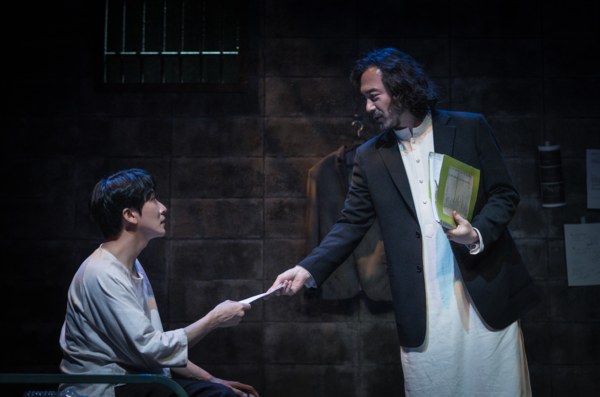
Despite viewing capitalism as the cause of all their problems, there is irony in the fact that the Pakistan militant group has no choice but to rely on Nick and his knowledge of the stock market to finally improve the quality of life of local Pakistanis. Is there a lesson to be learned from these conflicting ideals?
The “Invisible Hand” moves again. However, it moves not in favor of the general public but for the upper stratum of society. The impact of the COVID-19 pandemic and the Ukraine War has caused a halt in global economic growth and a rise in inflation. The aftermath is expected to have devastating effects on businesses as well as middle and lower-wage households. While still recovering from the economic toll caused by the pandemic, small enterprise owners in Korea must yet again prepare for a second war with the economy.
The Invisible Hand is highly recommended to all individuals living in the 21st century. For those who are already fond of the international political economy, the play will either further strengthen or question existing views on the topic. However, for those who are new to the idea of the global market, stocks, or political economics, the play will open their eyes to the financial world that once seemed so far away. Each character, brought to life by fantastic acting, and attitudes that change with every financial transaction, will allow viewers to understand how money constantly affects their reality.
However, be warned as the play is not for the faint-hearted. The overbearing tension between actors, the heartstopping sound effects, and the overall atmosphere will leave you shaken with fear and excitement. Even more thrilling than watching a scary movie, each line delivered, and each eye contact made will make you feel as if you are part of a kidnapping.
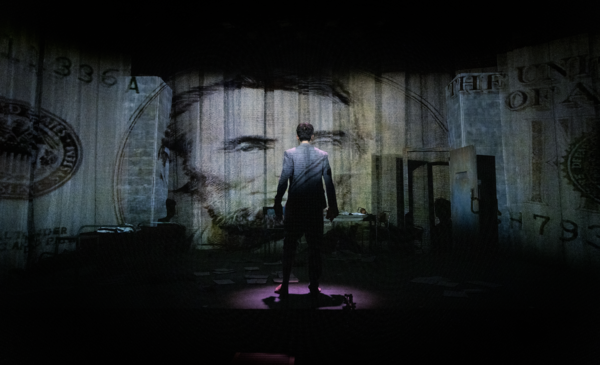
Finally, if you find yourself sympathizing with any of the four characters and agreeing with their decisions, ask yourself, how different are you really from these seemingly irrational characters? And last but not least, if the same had happened to you, what would you have done?
Date: 2022.04.26 ~ 2022.06.30
Place: 대학로아트원씨어터 Artone Theater
Running time: 110 minutes

